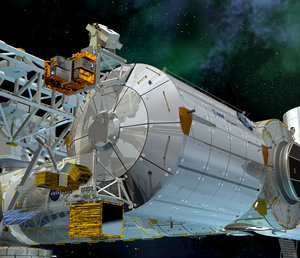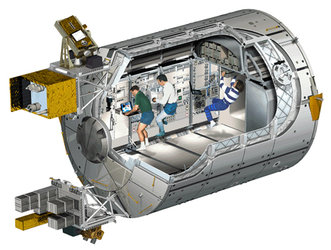ESA Columbus Essay Contest winner - Benjamin Lenoir
The value of human spaceflight for European citizens
"That's one small step for a man, one giant leap for mankind." In 1969, less than ten years after Gagarin’s flight in orbit, nobody questioned the relevance of human spaceflights. They were the goal of the whole process engaged in the two blocks: be the first to send a man in space. But, with the fall of the wall, a new area began, where there was no more reasons to show its technical superiority and therefore to send men in space. Then, considering the cost of such programs, the question of the value of human spaceflights came. And, today, the answer is obvious: despite the International Space Station, the majority of the space industry relies on unmanned missions.
However, if the economic rationality supports automatic spaceflights, human missions have not yet disappeared. The president of the USA even wants to return on to the moon and is peering at Mars. For a French citizen, member of the European Union, this asks the question of the value of human spaceflight for Europe and its citizens.
Space embodies the modern Frontier. But contrary to the pioneers in America, the conquest of space relies on technical capacities. Manned missions are therefore a wonderful way to energize research: it combines the dream of discovering new territories with the necessity to carry out researches to allow these trips in space.
In a world where innovation is the only way to stay at the top, the American success in the economic race is explained basically because of the strength of its research. The new French President understood this fact and aims at giving a new lease of live to research. But it would be a mistake not to think on a European scale: between the USA and China, European countries can be competitive only together. This is why human spaceflight is valuable for European citizens: it can be a strong bound on a European scale between many fields of research, which would directly benefit to them because innovation is the key of economic competitiveness. From this point of view, human missions are much more interesting because they require much more technologies than unmanned missions and consequently have a broader impact.
Coupled with this capacity of human spaceflight to create innovation, manned mission is also a great way to conduct research: that is the very purpose of the ISS. When the Columbus laboratory will be attached to the ISS, Europe will have the capacity to explore new fields of science thanks to the unique experimental conditions in orbit. Having a strong human spaceflight capacity is consequently the assurance for Europe to conduct independently the experiments it wishes to conduct.
Despite the fact that research may seem very far from everyday life in Europe, there is no question about the fact that it enhances the competitiveness of Europe’s production system and leads to a higher standard of living for every single European citizen.
Human spaceflight is valuable because of the research it induces and the economic benefits it brings. But the most important thing is somewhere else. Let’s remember the reasons why Gagarin went in space and Armstrong walked on the moon. It was basically because of the national pride of two nations which wanted to lead the space exploration. And this period of space exploration certainly created a true national identity in these two countries.
In the last few years Europe seemed to have reached an impasse. As it worked in the USA or in Russia during the Cold War, human spaceflight could be a way to create the feeling of a European citizenship among the inhabitants of Europe, feeling which still lacks to build a strong European Union. If well advertised, space conquest can make people proud of Europe and therefore willing to build it. We, the European citizens, often hear speeches saying that we abide by the American way of thinking. This statement is certainly true concerning human spaceflight since Europe is not able to send a man in space by itself. That is why building an ambitious European program may create a keen interest among European citizens.
In addition of the creation of a European spirit, mastering human spaceflight is undoubtedly empowering Europe on the world stage. On the one hand, the European leaders would be able to speak of Europe as a whole. On the other hand, since space industry is very close to defense, mastering human spaceflight show to the rest of the world the technical power of Europe. That is, for example, the reason why China is so keen on sending men into space: to show the rest of the world that they can do it and at the same time to say that they have the technical skills to develop missiles.
As a result, human spaceflight has major impacts for European citizens: it enhances their security while it helps creating a strong European Union.
In conclusion, despite the fact that most European citizens think they are not affected by human spaceflight, it has effects on their everyday life. In economic terms, it leads to more innovation which the essential factor to be competitive. The consequence is a higher standard of living for the European citizens. But the human spaceflight adventure may also result, as it happened in the USA or in Russia, in the creation of a European spirit which would give Europe a stronger position on the world stage to defend its citizens' interest.





